We may not have the course you’re looking for. If you enquire or give us a call on 01344203999 and speak to our training experts, we may still be able to help with your training requirements.
Training Outcomes Within Your Budget!
We ensure quality, budget-alignment, and timely delivery by our expert instructors.
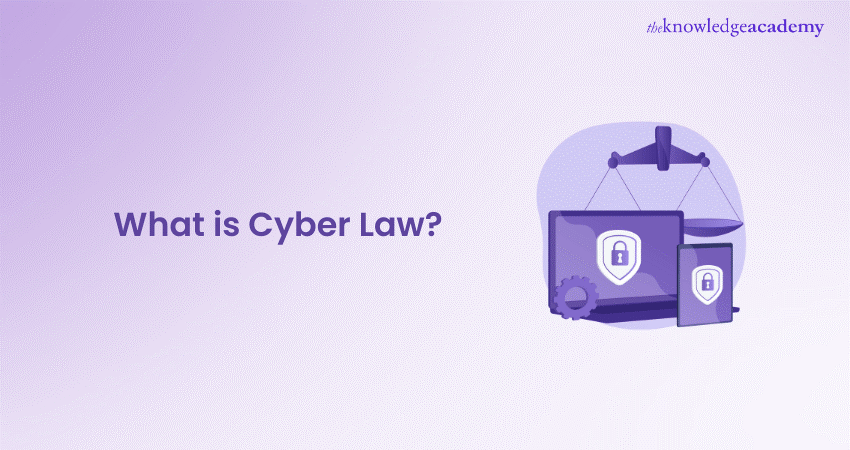
Have you considered how the internet impacts our daily lives? With increased connectivity comes vulnerability. Cyber Law emerges as a crucial safeguard in this digital age. It governs our online actions, protecting rights and regulating conduct.
This blog will simplify what Cyber Law entails and its importance. We’ll explore key concepts and recent developments. Understanding Cyber Law will empower you in navigating the online landscape safely. Let's embark on this journey to enhance your digital awareness.
Table of Contents
1) What is Cyber Law?
2) Objectives of Cyber Law
3) Importance of Cyber Law
4) Types of Cyber Law
5) Types of Cybercrime
6) Benefits of Cyber Law
7) Conclusion
What is Cyber Law?
Cyber Law refers to the legal framework governing the use of the internet, digital devices, and digital data. As our reliance on technology grows, so does the need for laws that protect individuals, businesses, and governments in the digital space.
Cyber Law covers various legal matters such as privacy, cybercrime, intellectual property, and other issues. These regulations are created to tackle the specific difficulties that arise in the online realm, guaranteeing that activities carried out on the internet are governed and that rights and duties are clearly outlined.
Objectives of Cyber Law
The main goal of Cyber Law is to ensure the protection and security of people and companies online. These objectives can be broadly categorised into the following areas:
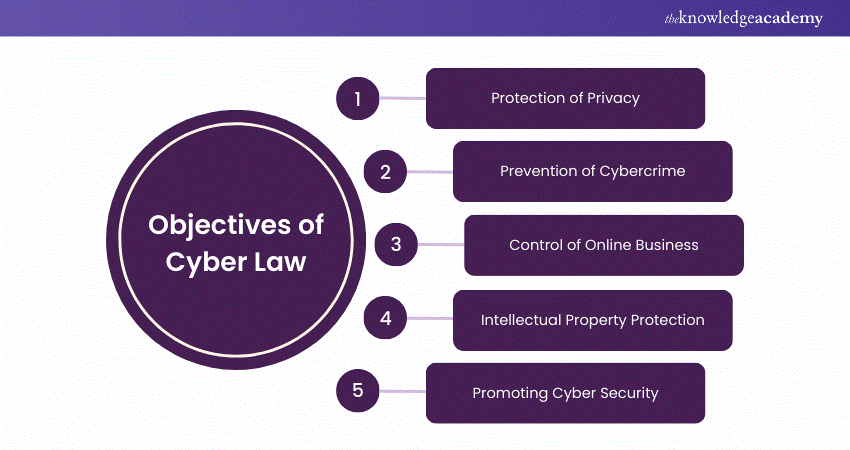
a) Protection of Privacy: Cyber Laws focus on safeguarding individuals' privacy by controlling the collection, storage, and utilisation of personal data. This includes laws that govern data breaches, identity theft, and unauthorised access to personal information.
b) Prevention of Cybercrime: Cyber Laws are essential for preventing and addressing cybercrimes such as hacking, cyberstalking, and phishing. These laws establish a legal structure for pursuing cybercriminals and provide safeguards for victims.
c) Control of Online Business: Cyber Laws are essential in overseeing e-commerce operations due to the increase in online shopping and digital transactions. This includes ensuring the security of online payments, protecting consumers from fraud, and defining the legal validity of electronic contracts.
d) Intellectual Property Protection: Cyber Law protects the intellectual property rights of individuals and organisations in the digital space. This includes copyright, trademark, and patent laws that prevent the unauthorised use of digital content.
e) Promoting Cyber Security: Cyber Laws are also focused on promoting Cyber Security practices among individuals, businesses, and governments. This includes establishing standards for protecting digital infrastructure and responding to cyber threats.
Importance of Cyber Law
Cyber Law is essential in today's interconnected world for several reasons:
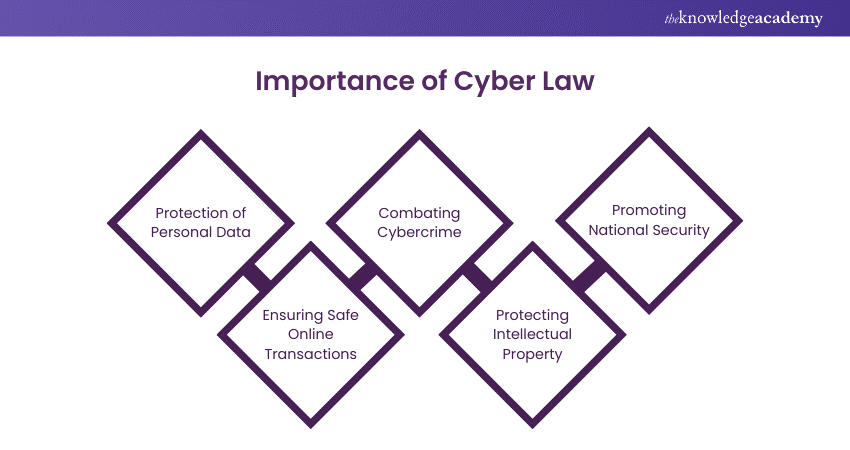
a) Protection of Personal Data: In an era where personal information is often shared online, Cyber Law ensures that individuals' privacy is safeguarded. It regulates how companies collect, store, and use personal data, helping to prevent identity theft and data breaches.
b) Ensuring Safe Online Transactions: With the growth of e-commerce, Cyber Law provides a legal framework that ensures the security of online transactions. This involves safeguarding consumers against deceit and verifying that electronic agreements hold legal weight.
c) Combating Cybercrime: Cyber Law plays a crucial role in combating various forms of cybercrime, including hacking, cyberstalking, and phishing. It equips law enforcement with the necessary tools to combat cybercriminals through investigation and prosecution.
d) Protecting Intellectual Property: Safeguarding intellectual property is crucial in the digital era due to its increasing significance. Cyber Law ensures that creators and businesses can protect their digital assets, such as software, music, and trademarks, from unauthorised use.
e) Promoting National Security: Cyber Law plays a crucial role in safeguarding national security by defending against cyberattacks on critical digital infrastructure. Governments use these laws to establish Cyber Security measures and respond to threats that could harm national interests.
Master the Essentials of Cyber Security and Safeguard What Matters Most - Equip Yourself with the Skills to Defend Against Threats with our Cyber Security Training now!
Types of Cyber Law
Cyber Law covers a broad spectrum of legal issues, each addressing specific aspects of the digital world. Here are some of the key types of Cyber Law:
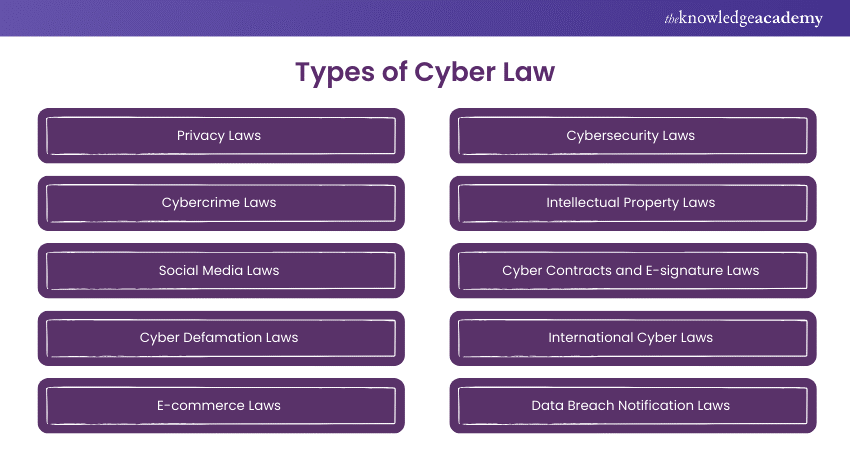
1) Privacy Laws
Privacy laws govern how personal data is gathered, stored, and utilised by individuals, companies, and governments. These regulations are created to safeguard individuals' privacy and stop unauthorised entry to personal data. Privacy regulations in numerous nations mandate that corporations must inform individuals in case of a data breach.
2) Cybercrime Laws
Cybercrime Laws focus on preventing and addressing criminal activities conducted online. This includes hacking, identity theft, cyberstalking, and other forms of cybercrime. These laws provide law enforcement agencies with the legal tools needed to investigate and prosecute cybercriminals.
3) Social Media Laws
Social Media Laws govern the use of social media platforms and the content shared on them. These laws address issues such as online harassment, defamation, and the spread of false information. Social media laws also regulate the responsibility of social media companies to monitor and remove harmful content.
4) Cyber Defamation Laws
Cyber Defamation Laws address defamation that occurs online. Defamation is the act of making false statements about a person or organisation that damage their reputation. Cyber Defamation Laws provide legal remedies for individuals and businesses that have been defamed online, including through social media, blogs, and other platforms.
5) E-commerce Laws
E-commerce Laws regulate online business transactions, ensuring that digital contracts are legally binding and that online payments are secure. These laws protect consumers from fraud and establish guidelines for the conduct of e-commerce businesses.
6) Cyber Security Laws
Cyber Security Laws focus on protecting digital infrastructure from cyber threats. These laws establish standards for Cyber Security practices, including the protection of networks, systems, and data from unauthorised access and cyberattacks.
7) Intellectual Property Laws
Legal regulations safeguard the rights of innovators and companies in the online realm. This includes copyright, trademark, and patent laws that prevent the unauthorised use of digital content, such as software, music, and trademarks. Intellectual Property Laws are essential for protecting digital assets and promoting innovation in the digital economy.
8) Cyber Contracts and E-signature Laws
Cyber Contracts and E-signature Laws regulate the use of electronic contracts and digital signatures in online transactions. These laws ensure that electronic contracts are legally binding and that digital signatures are recognised as valid. Cyber Contracts and E-signature Laws are essential for facilitating secure and efficient e-commerce activities.
9) International Cyber Laws
International Cyber Laws address legal issues that arise in the global digital environment. These laws regulate cross-border data transfers, international cybercrime, and other activities that involve multiple countries. International Cyber Laws are essential for ensuring that digital activities are conducted in a way that respects different jurisdictions' laws.
10) Data Breach Notification Laws
Data Breach Notification Laws mandate that organisations must inform individuals and authorities if there is a data breach. These laws aim to safeguard individuals' privacy by guaranteeing that they are notified when their personal data has been exposed.
Types of Cybercrime
Cybercrime includes a variety of criminal activities conducted over the internet. Some of the most frequently seen forms of cybercrime include.
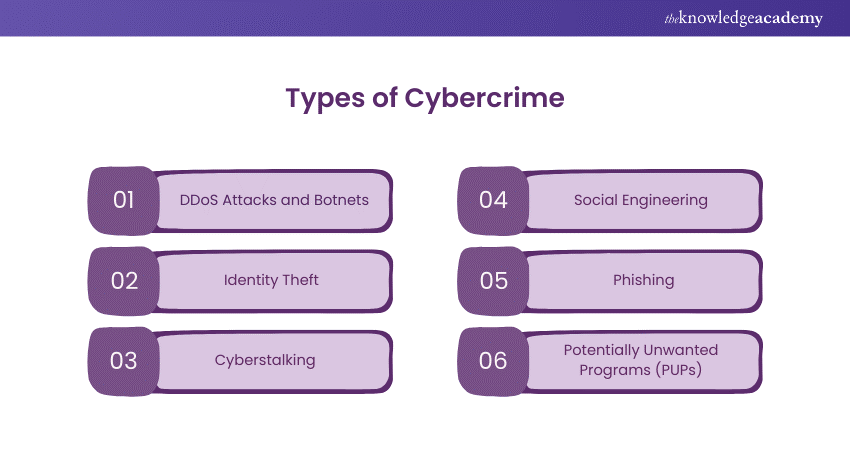
1) DDoS Attacks and Botnets
DDoS attacks consist of overwhelming a website or online service with traffic, preventing users from being able to access it. Botnets consist of compromised computers utilised for executing these attacks. DDoS assaults can lead to major disturbances for companies and institutions, so Cyber Laws are crucial for halting and dealing with these dangers.
2) Identity Theft
Identity theft happens when an individual obtains unauthorised access to personal information and uses the personal details of another individual, like their name, using credit card information, or social security number, to commit fraud. Identity theft can lead to monetary loss and harm to a person's image.
3) Cyberstalking
Cyberstalking involves using the internet to harass, threaten, or intimidate someone. This can include sending threatening emails, monitoring someone's online activity, or using social media to spread false information about them. Cyberstalking is a severe offence that can cause significant harm to its victims.
4) Social Engineering
Social Engineering is a type of cybercrime that involves manipulating individuals into divulging confidential information. This can include phishing, where criminals pretend to be real organisations to deceive people into giving out personal details or pretexting, where a criminal creates a fabricated scenario to gain access to sensitive information.
5) Phishing
Phishing is a cybercrime involving sending deceptive emails or messages that look like they come from real sources. The aim of phishing is to deceive people into disclosing personal information like passwords or credit card information. Phishing is a prevalent and risky form of cybercrime, and Cyber Laws are crucial in addressing this danger.
6) Potentially Unwanted Programs (PUPs)
Potentially Unwanted Programs (PUPs) are software apps that can be placed on a computer without the user's consent. PUPs can include adware, spyware, and other types of malicious software that can compromise a user's privacy and security. Cybercrime Laws are important for regulating the distribution of PUPs and protecting individuals from these unwanted programs.
Benefits of Cyber Law
Cyber Law offers numerous benefits for individuals, businesses, and governments:
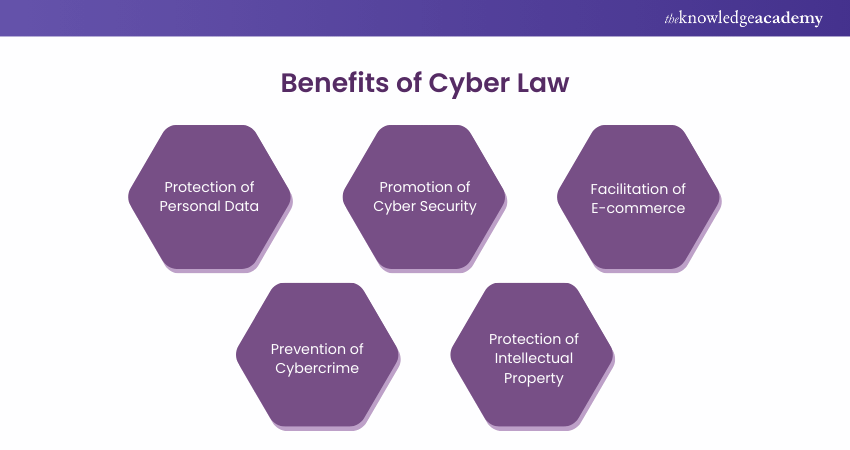
a) Protection of Personal Data: Cyber Law ensures that individuals' personal data is protected from unauthorised access and misuse. This is particularly important in an era where personal information is frequently shared online.
b) Promotion of Cyber Security: Cyber Law promotes the adoption of Cyber Security practices that protect digital infrastructure from cyber threats. This includes establishing standards for protecting networks, systems, and data from unauthorised access and cyberattacks.
c) Facilitation of E-commerce: Cyber Law provides a legal framework that facilitates secure and efficient e-commerce activities. This includes ensuring the legality of electronic contracts, protecting consumers from fraud, and regulating online transactions.
e) Prevention of Cybercrime: Cyber Law plays a crucial role in preventing and addressing cybercrime, including hacking, cyberstalking, and identity theft. These regulations equip law enforcement organisations with the necessary resources to probe and charge cyber offenders.
f) Protection of Intellectual Property: Cyber Law protects the intellectual property rights of creators and businesses in the digital space. This is essential for promoting innovation and ensuring that digital assets are not used without authorisation.
Secure the Digital World – Join our Cyber Security Risk Management Course and Learn to Outsmart Cyber Threats. Start Today!
Conclusion
Cyber Law is essential in protecting privacy, combating cybercrime, and securing online activities in our increasingly digital world. As technology advances, these laws will continue to evolve, ensuring safety in the digital environment. In this blog, we’ve explored the various aspects of Cyber Law and its critical role in shaping a secure digital future.
Master the skills to protect the digital world. Register for our Certified Cyber Security Professional (CCS-PRO) Course today!
Frequently Asked Questions

Individuals with a background in law, IT, or computer science, or professionals seeking to specialise in digital law, can pursue a Cyber Law course. Some courses may require a bachelor's degree, while others may be open to anyone with an interest in the field.

Cyber Law encompasses privacy protection, cybercrime prevention, intellectual property rights, e-commerce regulations, and Cyber Security practices. It offers career opportunities in legal, governmental, corporate, and Cyber Security sectors, addressing the growing legal challenges of the digital world.

The Knowledge Academy takes global learning to new heights, offering over 30,000 online courses across 490+ locations in 220 countries. This expansive reach ensures accessibility and convenience for learners worldwide.
Alongside our diverse Online Course Catalogue, encompassing 19 major categories, we go the extra mile by providing a plethora of free educational Online Resources like News updates, Blogs, videos, webinars, and interview questions. Tailoring learning experiences further, professionals can maximise value with customisable Course Bundles of TKA.

The Knowledge Academy’s Knowledge Pass, a prepaid voucher, adds another layer of flexibility, allowing course bookings over a 12-month period. Join us on a journey where education knows no bounds.

The Knowledge Academy offers various Cyber Security Training, including Certified Cyber Security Professional (CCS-PRO), Cyber Security Awareness, and Cyber Security Risk Management. These courses cater to different skill levels, providing comprehensive insights into Cyber Security.
Our IT Security & Data Protection Blogs cover a range of topics related to Cyber Security, offering valuable resources, best practices, and industry insights. Whether you are a beginner or looking to advance your Cyber Security skills, The Knowledge Academy's diverse courses and informative blogs have got you covered.







 Top Rated Course
Top Rated Course




 If you wish to make any changes to your course, please
If you wish to make any changes to your course, please


